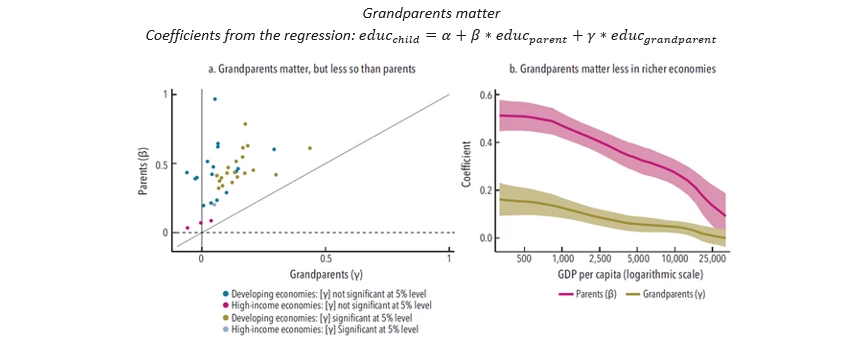A large body of literature has shown that the outcomes of children are tied to the outcomes of their parents or, in other words, that children face different life prospects based on their family background. But there is no reason to believe that such “persistence” of outcomes is limited to two generations. Social mobility (or lack thereof) depends not just on how parents influence the outcomes of their children, but also on how outcomes persist across multiple generations, from grandparents to grandchildren.
In many parts of the developing world, grandparents play a crucial role in the upbringing and development of their grandchildren, and their social status and connections can influence the life prospects of grandchildren. Although benefiting from the culture, values and wisdom of your grandparents is a good thing, the passing down of wealth, legacies and social status across generations can mean an added disadvantage for those children whose grandparents lack these endowments.
In any society where individuals’ outcomes are associated with the outcomes of their parents, grandparents will have an indirect impact on outcomes through the individual’s parents (who are in turn influenced by their parents). But consider a country in which grandparents’ outcomes directly influence the outcomes of grandchildren over and above the effect transmitted through the parents of these children. Such a country would exhibit more persistence of poverty and privilege across time than a country in which grandparents matter only to the extent that they influence the outcomes of the parents.
A recent summary of the handful of articles written about multigenerational mobility concludes that, for the most part, grandparents do not have any appreciable direct effect beyond the indirect effect through parents. Yet almost all the evidence is from high-income countries and evidence is limited in the developing world. One paper on rural China suggests that grandparents have a non-negligible effect on grandchildren if they reside in the same household.
With the launch of the report Fair Progress: Educational Mobility Across Generation Around the World and its associated database, for the first time, patterns of multigenerational mobility can be analyzed in dozens of countries spanning the developing world in a consistent manner. Particularly, the report examines whether the years of schooling of children depend on the years of schooling of their grandparents – above and beyond the effect channeled through the parents.
In 39 economies for which multigenerational links could be established, in many of the cases, grandparents have a sizeable and significant effect on children’s educational outcomes. In panel (a), most of the estimated coefficients are located between the vertical line and the diagonal line (corresponding to the 45-degree line). This suggests that the educational attainment of parents and grandparents both have a positive effect on the education of the current generation, but that the effect of parents is stronger – often two to three times stronger – than the effect of grandparents.
The impact of grandparents tends to be larger in developing countries. Indeed, panel (b) shows that the impact of grandparents approaches zero for high-income countries. This might explain why the empirical literature on multigenerational mobility in high-income countries rarely finds that the effect of the education of grandparents is crucial for the education of the current generation.
These findings have important implications for intergenerational justice. The results imply that intergenerational mobility in education in developing economies may be even lower than suggested by the traditional measures that link two generations. Moreover, the disadvantages of birth in a family with low educational attainment are more likely to persist across several generations in poorer countries than in richer countries. If everyone is to #inheritpossibility, it is vital that links of privilege and poverty across generations are broken such that everyone has a fair chance to flourish in life. The Fair Progress report points to several policies that may help overcome these intergenerational inequities.






Join the Conversation